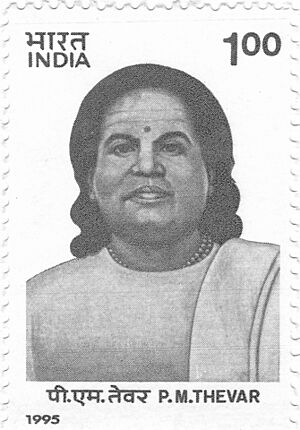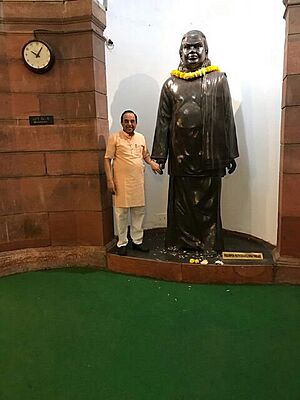Pasumpon Muthuramalinga Thevar facts for kids
Quick facts for kids
Pasumpon Muthuramalinga Thevar
|
|
|---|---|

Portrait of Muthuramalinga Thevar on a postal stamp
|
|
| Born |
Pasumpon Ukkirapandi Muthuramalinga Thevar
30 October 1908 Pasumpon (village), Ramnad District, Madras Presidency, British India (now in Ramanathapuram District, Tamil Nadu, India)
|
| Died | 30 October 1963 (aged 55) |
| Resting place | Pasumpon, Tamil Nadu |
| Other names | Deiva Thirumaganar |
| Occupation | Indian Freedom Fighter, Farmer, Politician |
| Known for | Collaboration with Netaji Subash Chandra bose for strengthening INA from Tamil Nadu. Opposition of Criminal Tribes Act. |
| Political party | All India Forward Bloc |
Ukkirapandi Muthuramalinga Thevar (born October 30, 1908 – died October 30, 1963) was an important Indian politician and leader. People also knew him as Pasumpon Muthuramalinga Thevar. He was elected three times to the national Parliament of India, called the Lok Sabha. Every year on October 30, his birthday is celebrated as Thevar Jayanthi in southern Tamil Nadu.
Contents
Early Life and Education
Muthuramalinga Thevar was born on October 30, 1908, in a village called Pasumpon. When he was young, his grandmother, Parvathiammal, took care of him. She was upset with his father for marrying new wives after his second wife passed away.
A family friend, Kuzhanthaisami Pillai, helped Muthuramalinga Thevar with his schooling. He first had a private teacher. Then, in 1917, he went to an elementary school in Kamuthi. Later, he studied at Pasumalai High School and then Union Christian High School in Madurai.
However, Muthuramalinga Thevar did not finish his studies. He had to return home to deal with a family property case. This case lasted until 1927, and the court decided in his favor. His father passed away in 1939.
Fighting for Justice
Muthuramalinga Thevar was very upset about a law called the Criminal Tribes Act (CTA). This law unfairly targeted certain communities. He believed these communities needed to join the Indian National Congress party to fight against it.
In 1936, he ran for election to the Ramnad District Board. This was his first election, and he won against his opponent. After this, he wanted to become the president of the District Board. But to keep the Congress party united, he agreed to step aside.
He also joined the Congress Socialist Party in 1936. This group worked for social fairness.
The 1937 Election
Before the 1937 elections, Thevar encouraged young people to join the Congress party. The government tried to stop him from traveling and speaking in public.
In February 1937, Thevar ran for the assembly election in Ramanathapuram. He won by a lot of votes against a powerful opponent, the Raja of Ramnad.
After the election, the Congress party formed the government. Thevar hoped they would remove the unfair Criminal Tribes Act. But the new Chief Minister, C. Rajagopalachari, did not remove it.
Supporting Workers' Rights
In the late 1930s, Thevar became very active in helping workers. He started and led several groups for mill workers. These groups worked to improve working conditions and get fair treatment.
During a long strike at the Pasumalai Mahalaskshmi Mill, Thevar was put in jail for seven months. The workers wanted their fired colleagues to get their jobs back. In the end, the mill agreed to the workers' demands. He also led a strike at the Madura Knitting Company.
In 1945, he became the first president of the TVS Thozhilali Sangam, another workers' union.
Joining the Forward Bloc
In 1939, Thevar went to a big meeting of the Indian National Congress party. At this meeting, Subhas Chandra Bose was challenged for the party's top position. Thevar strongly supported Bose, who won the election.
However, Bose later had to resign. He then started a new group called the Forward Bloc on June 22, 1939. This group wanted to unite all left-wing groups within the Congress. Thevar joined the Forward Bloc because he was disappointed that the Criminal Tribes Act was not removed. When Bose visited Tamil Nadu, Thevar helped organize a big welcome for him in Madurai.
Helping with Temple Entry
In 1939, a new law was passed that allowed Dalits to enter Hindu temples. Before this, they were not allowed. Thevar strongly supported this change.
On July 8, 1939, he helped an activist named A. Vaidyanatha Iyer take Dalits into the Meenakshi Temple in Madurai. Thevar warned anyone who tried to stop them that he would be there to face them. Because of his strong stand, no one dared to stop the Dalits from entering the temple.
Time in Jail
The government was worried about Thevar's growing popularity. He was also involved in many worker protests. He was told not to leave Madurai. But in September 1940, he traveled to his hometown, Pasumpon. He was arrested and put in jail for 18 months. Many people in Tamil Nadu were upset about his arrest.
Soon after he was released, he was arrested again. He was finally set free from prison on September 5, 1945.
After Prison
In 1945, C. Rajagopalachari tried to regain power in the Congress party in Tamil Nadu. But most of the party members were against him. At a meeting, there was a lot of disagreement. Thevar stepped in and helped re-elect Kamaraj as the party president.
In March 1946, elections were held again. Thevar was elected without anyone running against him. Soon after, the unfair Criminal Tribes Act was finally removed.
In 1948, the Congress party removed groups that disagreed with them, including the Forward Bloc. The Forward Bloc then became its own political party. Thevar became the head of the Forward Bloc in Tamil Nadu and stayed in that role for the rest of his life.
The 1952 Election
In January 1952, India held its first general elections after becoming independent. Thevar ran for two positions: one in the Lok Sabha (national parliament) and one in the state assembly. He won both elections. He decided to give up his Lok Sabha seat to focus on the Madras legislative assembly.
After the election, the Congress party did not have enough votes to form a government on their own. Thevar worked with the Communist Party of India to try and form a government without Congress. However, the governor stepped in and made C. Rajagopalachari of the Congress party the Chief Minister.
Forward Bloc Changes
In 1955, there were disagreements within the Forward Bloc party. Some leaders thought the party should join the Congress party. But many others disagreed.
A special meeting was held, and the leaders who wanted to join Congress were removed from the party. Hemanth Kumar Bose became the new chairman, and Thevar became the deputy chairman. He held this position until he passed away.
The 1957 Election
In December 1955, Thevar visited Burma again. He took part in political and religious events there. When he returned in 1956, he started getting ready for the next general election.
In the 1957 election, Thevar again ran for both the Lok Sabha and the state assembly. He won both seats. This time, he chose to give up his state assembly seat to focus on the national parliament.
Ramnad Conflicts
Because Thevar gave up his assembly seat, a special election was held in July 1957. The Forward Bloc candidate won this election. On the day the results were announced, there were conflicts between different groups in the area. These conflicts spread throughout the district.
Thevar returned from Delhi in September and took part in a 'Peace Conference'. He met with leaders from different communities. The conference decided that all communities should live together peacefully.
Later Years and Legacy
After being released from prison, Thevar helped organize the Madurai city elections in March 1959. His party, the Forward Bloc, formed an alliance with other parties. This alliance won the elections, and for the first time, the Congress party lost control of the city.
After this, Thevar's health got worse, and he did not participate as much in public life. He was nominated for the 1962 Lok Sabha election and won again. But he was too unwell to travel to Delhi for parliament meetings. Thevar passed away on October 30, 1963, on his 55th birthday.
After his death, the Forward Bloc party in Tamil Nadu became weaker. His follower, P.K. Mookiah Thevar, took over the leadership. Over time, many of the people who supported the Forward Bloc started supporting other parties.
Muthuramalinga Thevar has received many honors. In 1968, a college was named after him. His life story was included in high school textbooks in Tamil Nadu. In 1971, his burial place became an official memorial. A life-size portrait of him was placed in the Tamil Nadu assembly in 1980. In 1984, a district was named 'Pasumpon Muthuramalingam District'. In 2002, a life-size statue of Thevar was unveiled in the Parliament House by the President of India, A.P.J. Abdul Kalam.


